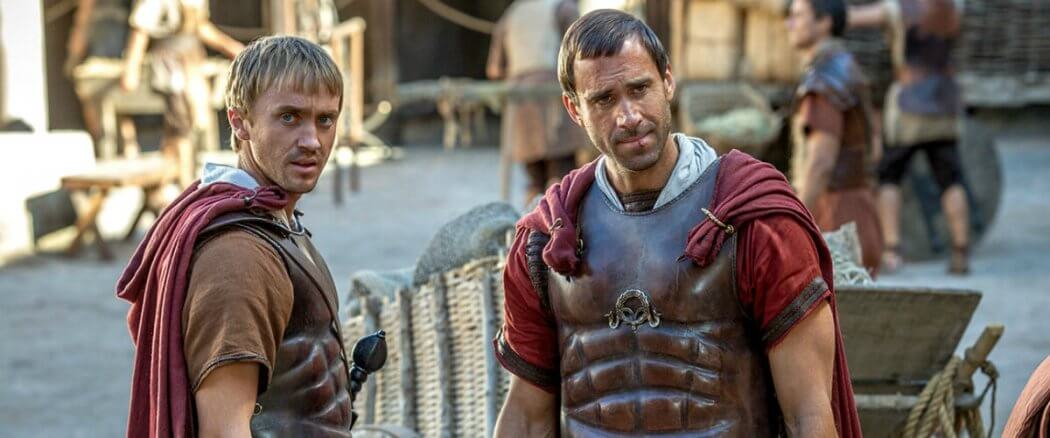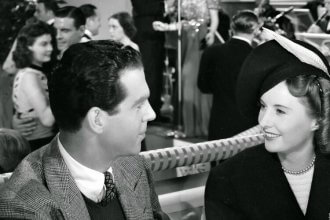Most Easter seasons of the last decade, Hollywood has given those of the Christian faith a movie or TV special/series with a biblical theme — the more money to make. This year there are actually two, Risen and The Young Messiah. And I suppose you could also count Miracles from Heaven in that group, although it is a Christian film rather than a biblical one.
Of the two biblical films, Risen appears to be the better movie based on critic’s opinions, but I have not yet seen The Young Messiah. Risen appears to be a British production, so we once again have Jews and Romans speaking the King’s English with (sometimes) heavy Oxford accents. Regardless, I have seen Risen and for me it was worth the time and money, offering drama, suspense, and understanding for Christ-followers as well as those who are not.
Rome in Charge
The youth group my wife Barbara and I lead love films with soldiers and battle scenes. (What is it about us that we are so adrenalized by those depictions? I have my theories but this review is not about that.) Risen, after a (at that moment) puzzling prologue, starts with a doozy. Roman soldiers are battling Jewish zealots and it is pretty amazing to see the innovation of the under-equipped Jews and the well-rehearsed and organized response of the Romans. The leader of the Romans is the powerful tribune Clavius, who takes his orders directly from Pontius Pilate (Peter Firth as an anxious but ruthless ruler). Clavius is played by the great actor Joseph Fiennes. Clavius leads his troops into bloody battle and it is not for the faint of heart (Barb had to turn her head until I told her it was over).
Roman soldiers, who served decades away from their homes with a high likelihood they would not be returning, were not “nice folk.” Clavius is obviously war-hardened but also weary of it all. When asked by Pontius what he wants in life, Clavius answers in the plural, “An end to travail; certainty; peace; a day without death.” And Risen is a story of his search for those goals.
Troubles in Jerusalem
A spent Clavius arrives back in Jerusalem from his successful battle just in time for Pontius to tell him he has just then ordered crucified the increasingly popular Nazarene rabbi known as Jesus/Yeshua, mostly at the insistence of the Jewish Sanhedrin and its high priest Caiaphas. Pontius adds, “It’s as if He wanted to be sacrificed.” He asks Clavius to “clean up” the situation because the Emperor Tiberius is about to arrive (probably not historically accurate). Tiberius expects, above all, “Order… order.” Pontius also commands Clavius to give “the Nazarene a small mercy” by breaking his legs and hastening his death. (See clip here.)
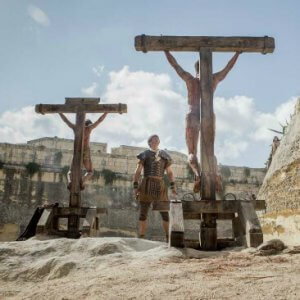 Clavius goes to the Golgotha, the site of the crucifixion, and finds Jesus on the cross (with the two thieves on either side) and just barely alive. (See clip here.) In the movie, he has the executioners break the legs of the thieves but at the last minute decides to have them perform the less usual act of thrusting a spear into Jesus’ side (thereby fulfilling the Leviticus 22:22 command that for a sacrifice “not a bone of him shall be broken” and the Zechariah 12:10 prophecy “they will look on me, the one they have pierced”).
Clavius goes to the Golgotha, the site of the crucifixion, and finds Jesus on the cross (with the two thieves on either side) and just barely alive. (See clip here.) In the movie, he has the executioners break the legs of the thieves but at the last minute decides to have them perform the less usual act of thrusting a spear into Jesus’ side (thereby fulfilling the Leviticus 22:22 command that for a sacrifice “not a bone of him shall be broken” and the Zechariah 12:10 prophecy “they will look on me, the one they have pierced”).
Of course, biblically Jesus had already died when this occurred, but this must be artistic license, one of several we see in Risen. Clavius confirms that Jesus has died and tells his soldiers, the executioners, and the on-lookers, “It’s over. Go on home.”
The Missing Body
And we Bible readers know what follows — Joseph of Arimathea asks to take Jesus’ body and places it in his own tomb, Caiaphas comes to Pontius demanding the tomb be sealed and guarded, and a large stone is rolled over the entrance to the cave/tomb. The trusted Clavius, just back from the funeral pyres of his soldiers lost in battle, is given the job to see that the tomb is secure. (See clip here.) After the tomb is found empty the day after the Sabbath, the Sanhedrin is furious with Pontius, and so in turn is Pontius with Clavius who is put in charge of finding the “stolen body” with his career on the line. (See clip here.) Assisting him is the new, ambitious Lieutenant Lucius played by Tom Felton of Harry Potter infamy.
First Clavius visits the tomb — complete with an unnecessary and grating reference to the Shroud of Turin. Then he is off to root out Yeshua’s followers who “must have stolen his body to pull off this hoax.” And because Pontius says, “Without a corpse to pronounce him dead we have to proclaim him Messiah,” Clavius has his soldiers perform the grizzly task of digging up and examining every dead body from the last week thinking that Jesus’ followers must be hiding his rotting body among the dead.
Clavius does eventually find Mary Magdalene (played in an unglamorous and effective turn by Maria Botto). Clavius questions her but to no avail as she seems to live on a spiritual and not physical level. She tells Clavius and Lucius, “You look for the wrong thing.” For me this scene is very effective.
Clavius’ Search
The rest of the story plays out from the viewpoint of Clavius coming to the realization of what really happened that morning at the tomb when his soldiers fled in terror, and the effect it has on his own life. The film shows many of the events that Christ-followers like me have perhaps never seen portrayed before and supplements those events with what might have happened (“Jesus did many other things as well. If every one of them were written down, I suppose that even the whole world would not have room for the books that would be written.” John 21:25).
It is an engrossing story in terms of being reminded of what the Bible tells us happened after Christ rose. In addition we see the story of a non-believer, worshiper of Mars the God of War, when he realizes he has come face to face with a God made flesh who preaches love, compassion, and peace. As Bartholomew says when questioned by Clavius, “Our only weapon is love.” Clavius becomes so shaken by the seemingly “impossible” actually having occurred that (mild spoiler alert) he deserts his post leaving a letter that says, in part, “I have seen two things I cannot reconcile. A man dead without question. And that man alive again.”
A “Good” Biblical Film
I love many things about the movie. The disciples are seen as a band of men who do not always figure out quickly what is going on but believe fiercely when they do. And how wonderful it was for me to see them portrayed as a happy, laughing group of men who so loved their Yeshua and who were absolutely thrilled at his miraculous resurrection. Thomas’ doubting is there, as is Peter’s rash but unbridled enthusiasm.
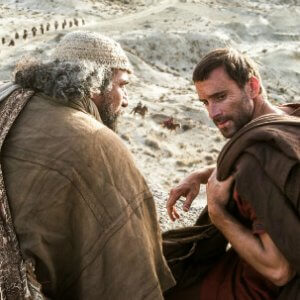 Peter is played by a very believable Stewart Scudamore (if you have ever seen the wonderful little film The Infidel you will remember him). Peter, when asked by Clavius how this all could be happening, answers, “I haven’t every answer. We’re astounded too.” And later Peter says, “We are followers. We follow God to find out.” And I love the “Feed my sheep” scene, one of my favorite stories of Christ and his disciples. It brought me to tears, as was the case for numerous scenes in Risen’s final half.
Peter is played by a very believable Stewart Scudamore (if you have ever seen the wonderful little film The Infidel you will remember him). Peter, when asked by Clavius how this all could be happening, answers, “I haven’t every answer. We’re astounded too.” And later Peter says, “We are followers. We follow God to find out.” And I love the “Feed my sheep” scene, one of my favorite stories of Christ and his disciples. It brought me to tears, as was the case for numerous scenes in Risen’s final half.
On a cinematic level, the film (shot in Spain and Malta) appears authentic and well-funded with rich detail. While there is not a “cast of thousands,” neither is this an “on-the-cheap” film trying to be an epic. I was impressed by the street scenes and the mob at the foot of the cross. I loved the makeup that kept Clavius’ lip bloodied and scabbed throughout the short time period covered in the film. (OK, I am a physician and it annoys me when wounds heal up overnight and when extremities freeze but yet appear wholly functional the next day — talking about you, The Revenant. Grin.) And I loved that Christ was played by a person of color (no, not of Middle Eastern descent but Cliff Curtis, a native Maori from New Zealand). Risen is well-acted and well-directed. I promise you that you will not leave saying, “Another lousy, cheap, and embarrassing biblical movie.”
Saint or Prostitute?
There were two major issues in this movie that annoyed me. One was the treatment of Mary Magdalene as a prostitute. Clavius finds out where she is by going to his Roman soldier’s barracks and asking them who “knows” her and almost the entire room of soldiers holds up their hands, clearly implying she is for hire. I am astounded that the writer of Risen, who obviously has done much research into the biblical story which this film uses as its basis, continues to perpetrate the myth that Mary Magdalene was a “woman of ill repute.” Mary Magdalene is mentioned three times in the Bible, the first as a woman from whom Jesus drove out 7 demons, then as a woman at the foot of his cross, and finally, most famously, as the woman outside his tomb who realized the man she mistook for a gardener was, in fact, the “risen” Christ. The fact that Mary Magdalene persistently has the onus of a whore about her suggests to me something about the male dominated, patriarchal history of, not God and his kingdom, but “religion” and the historical church. It was unnecessary and a grievous error for Risen to have her portrayed in this fashion.
Jew vs. Gentile
The more complex problematic issue is the idea that Jews could so easily accept the Clavius character, a Gentile, into their midst. While Jesus ministered to several non-Jews during his recorded life on earth (the centurion’s servant, a Samaritan women, a leper, and others), in Matthew 10:16 He specifically tells his disciples not to go preach to the Gentiles. (“Go nowhere among the Gentiles… but rather to the lost sheep of the house of Israel.”) However in his Great Commission (Matthew 28:19a) he says, “Go and make followers of all the nations.” Of course, the Great Commission happens at the very end of this film.
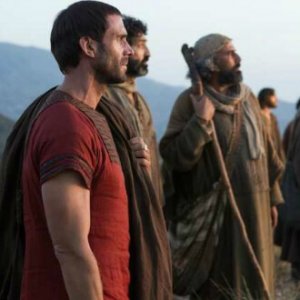 The issue of Jew versus Gentile is a matter of much debate and complexity far beyond my training or wisdom, but let me say at the time of the events taking place in this film, such issues were not decided. The disciples had just a few weeks before being given, at the Last Supper, the New Covenant and then witnessing their leader’s horrible execution. Their heads must have been spinning.
The issue of Jew versus Gentile is a matter of much debate and complexity far beyond my training or wisdom, but let me say at the time of the events taking place in this film, such issues were not decided. The disciples had just a few weeks before being given, at the Last Supper, the New Covenant and then witnessing their leader’s horrible execution. Their heads must have been spinning.
Later Peter (after this film’s time) was central in opposing Gentiles to be included in the Christian community unless they were circumcised. Peter was in the end persuaded differently only by a miraculous vision, so for of all people Peter to be the person to (spoiler alert) embrace Clavius and call him his “brother” before any of this was revealed to him would seem to me very unlikely.
Issues with Which We All Struggle
In the end, though, the movie belongs to Clavius as portrayed by Joseph Fiennes. I have read that some discount his portrayal as too stoic, but I find it quite convincing. This is a man who has seen much of the worst men can offer and who is confronted with a reality completely foreign to him — God’s mercy and grace. Are we surprised that he is in emotional shock? There are many scenes where Fiennes is contemplative, and one can feel his mind trying to process all this new information. His one-on-one with Jesus (Is it a dream? Does it matter?) where Jesus asks him, “What are you afraid of?” and Clavius answers, “Being wrong… and wagering eternity on it” is what those of us who have doubts (that is, all of us) have said to ourselves many times. I so admire Fiennes’ portrayal.
I encourage all Christ-followers to see the movie in the theater or later in home viewing. And do invite some “maybe-believers” or non-believers to view it with you. Its portrayal of the events immediately following Christ’s death will stir you and make you proud to call yourself a Christian. I will long remember the scene where Bartholomew, during his interrogation by Clavius and under risk of himself being crucified, is asked where the disciples of Yeshua are. Bartholomew leans in and whispers into the ear of an expectant Clavius, “They’re everywhere.” Amen — may it be so.

